AI in Healthcare: Real-Life Applications of AI in Diagnostics and Surgery
Artificial Intelligence (AI) has emerged as an essential accelerator within the healthcare sector, significantly enhancing diagnostic precision, surgical accuracy, and comprehensive patient management. For example, IBM Watson has exhibited notable efficacy in assisting oncologists by determining optimal treatment regimens for cancer, thereby illustrating AI’s potential in critical decision-making frameworks. From the automation of routine administrative functions to the facilitation of advanced medical diagnostics, AI is fundamentally revolutionizing the delivery of healthcare services. In this scholarly article, we will explore multiple real-world applications of AI in diagnostics and surgical procedures that are transforming contemporary medical practice.
AI in Medical Imaging and Diagnostics
AI-driven algorithms possess the capacity to analyze medical imaging modalities—including radiographs, MRIs, and CT scans—with exceptional accuracy. Machine learning models undergo rigorous training on extensive datasets, encompassing clinical imaging and patient records, to detect abnormalities and produce comprehensive diagnostic insights. AI has been employed to identify early indicators of diseases such as cancer, tuberculosis, and diabetic retinopathy. This technology assists radiologists by swiftly highlighting areas of concern, thereby promoting more timely and precise diagnostic conclusions.

AI-Driven Predictive Analytics
AI-enhanced predictive analytics has fundamentally altered the manner in which healthcare practitioners project patient outcomes and foresee potential complications. By systematically scrutinizing data—including medical history, current clinical manifestations, and genetic markers—AI can estimate the probability of disease progression or adverse events. Healthcare institutions are increasingly implementing these predictive models to pinpoint patients at heightened risk for conditions such as heart failure or sepsis, thus facilitating preemptive interventions that enhance patient care and mitigate hospital admissions.

Virtual Health Assistants and Chatbots
AI-driven virtual health assistants and chatbots have surfaced as indispensable resources for initial diagnostics and patient engagement. These systems utilize natural language processing (NLP) to proficiently communicate with patients, collect symptomatology data, and furnish preliminary health recommendations. Chatbots play a pivotal role in the triaging process, offering direction on whether to pursue clinical intervention or manage symptoms autonomously. For instance, Babylon Health’s AI chatbot adeptly provides healthcare guidance, thereby alleviating the burden on healthcare professionals and ensuring that patients receive timely advice.
AI in Robotic Surgery
AI improves surgery by making robotic-assisted operations more precise and effective. In contrast to conventional surgical techniques, AI-integrated systems present enhanced visualization, diminished human error, and improved control, collectively resulting in superior surgical outcomes. Platforms such as the da Vinci Surgical System capitalize on AI to facilitate minimally invasive procedures with extraordinary precision. Advanced AI algorithms stabilize the surgeon’s hand, enhance three-dimensional visual feedback, and suggest optimal surgical trajectories, culminating in reduced surgical durations, smaller incisions, and expedited patient recovery.

Personalized Treatment Plans
AI helps create personalized treatment plans based on each patient’s unique medical needs. Through the analysis of integrated genetic data, lifestyle variables, and medical history, AI can propose tailored treatment pathways. This approach is particularly advantageous in the field of oncology, where AI supports oncologists in customizing cancer therapies to align with specific genetic mutations, thereby optimizing therapeutic efficacy while minimizing adverse effects.

AI and Early Detection
Timely detection is Crucial for effective disease management, and AI has demonstrated its capability to identify disease markers which can evade human scrutiny. For example, AI is being utilized to detect diabetic retinopathy from retinal imaging, thereby enabling early intervention to avert vision impairment. AI tools are also used to identify melanoma(Skin Cancer) from skin images and detect early cognitive decline indicative of Alzheimer’s disease. These AI-driven solutions are significantly enhancing early diagnostic accuracy, improving the chances for timely treatment and better patient outcomes.

Conclusion: AI as a Healthcare Game-Changer
AI is reshaping the healthcare landscape by accelerating diagnostics, enhancing surgical precision, and delivering personalized care. From analyzing complex medical images to supporting surgeons with robotic precision, AI has become an indispensable ally for healthcare professionals. As AI technology continues to evolve, it promises even greater innovations in healthcare, ultimately improving patient outcomes and the overall quality of care delivered worldwide.


Pingback: The Advancements in Ventilator Technology: What’s Next? - impbiomed.com